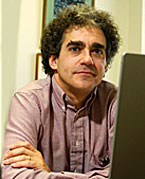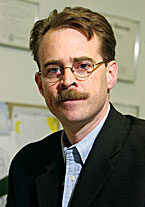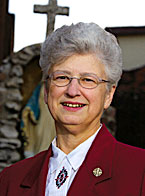


 |
 |
 |
|
|
Minding Human Medical Research The Human Studies Committee strives to maximize the benefits and minimize the risks |
||||||||
"We are already in an environment where people help people—serving on a human studies committee is a logical extension of that." Philip A. Ludbrook, MD |
THE BENEFITS OF HUMAN MEDICAL RESEARCH start with just one person—someone who agrees to become a research subject. More people join a study and researchers begin to build a body of data. That information helps them to develop medications and procedures that will benefit greater society. But all research involves risk. How is that risk assessed? How is research with human subjects conducted in the most humane, ethical, safe and effective way? At the School of Medicine, investigators began to ask themselves these questions decades ago and were among the first to establish standardized procedures providing safeguards for both researchers and subjects. Today, this type of oversight is mandated by the federal government, amid a sea of changing regulations. With a volunteer group of reviewers from the Medical Center and the community, Washington University has managed to not only stay ahead of the curve, but to be a leader at the forefront of ethical concerns—always with the best interest of just one person in mind. What makes the Human Studies Committee (HSC) at the School of Medicine so effective? Those who serve on its many component committees credit the group’s two administrative leaders: Philip A. Ludbrook, MD, associate dean and chairman, and Patricia M. Scannell, director. For 13 years, the two have dedicated themselves to keeping Washington University one step ahead—by addressing possible areas of concern early, often before a new issue comes under scrutiny. "It is this type of preventive thinking, driven by ethical concern, that has kept Washington University up to date and apart from the kinds of difficulties that other universities have faced in recent years," says Ludbrook. The key to the success of any human studies committee, he says, is ethics. In fact, the seminal group of the School of Medicine’s HSC was an ethics committee founded by John D. Vavra, MD, in the late 1960s. Vavra, who was a professor of medicine, started the group several years before there was any government requirement to monitor clinical research. When federal agencies, such as the Food and Drug Administration (FDA) and the National Institutes of Health (NIH), began to regulate research involving human subjects in the 1970s, expanding the purview of the ethics committee was a natural progression. For some researchers, however, the HSC’s efforts, while appreciated, also can be frustrating. Though the review process is streamlined and the number of committees and reviewers has been increased to accommodate the volume of protocols submitted, making required changes and resubmitting a study can delay research. But just as in good medicine, prevention is the key to better
overall health. The state of research at the School of Medicine is no
different. While the process may not always go as quickly as a researcher
might hope, most would agree that the goal of protecting everyone involved—human
subjects of research, investigators and the institution—outweighs
any necessary inconvenience. "Serving on the committee is looked upon quite agreeably by large numbers of our investigators," says Ludbrook. "Researchers here are often happy to serve or even volunteer to serve." At times, the HSC has even had to institute a waiting list for prospective members. Ludbrook says the reason why is simple. "We are already in an environment where people help people—serving on a human studies committee is a logical extension of that."
Philip A. Ludbrook, MD, associate dean and chair, and Patricia M. Scannell, director, have teamed up for more than a decade to ensure that the Human Studies Committee lives its mission: to protect the rights and welfare of human subjects. Background photo: Founder John D. Vavra, MD Community members who give their time to HSC service do so because they have a sincere desire to help others, says Scannell. Many have an interest in medicine and they are proud to be associated with Washington University. Getting people from all walks of life to participate and keeping them interested isn’t a problem. An area that does pose a challenge is managing the documentation involved in the submission and review process. A top priority of the group, already begun, is to convert all required forms to electronic, web-accessible versions. The HSC comprises an advisory committee, a genetics research committee, four new-protocol committees, and two continuing review committees, as well as four subcommittees that review adverse events, revisions and amendments in existing research. By February 2002, four additional committees will join the mix. This year, the combined committees of the HSC will review about 3,300 protocols, with a 40-60 split between new and continuing studies, says Scannell. To keep up, the HSC has increased its administrative staff to more than 20 people, and recently expanded its office space, moving to new quarters in July 2001. The new space includes a large conference room to accommodate HSC committees and the group’s education program. Before the move, meetings were held in various spaces throughout the Medical Center. One key staff addition was to bring Sarah Frankel, PhD, on board as the education coordinator. Frankel trains both new and sitting committee members to keep them abreast of regulatory and other issues relevant to clinical research. The more intensive training she has made possible assures all HSC reviewers a greater comfort level that can be attained at a faster pace. So what do reviewers look for when they review a protocol? Mainly, says Ludbrook, they are determining whether a protocol shows a reasonable methodology, keeps risks minimal, and benefits the study’s participants, as well as science and society. Other key concerns include issues of informed consent, confidentiality, and whether a study will involve a vulnerable population, such as children or pregnant mothers. "We don’t regard ourselves as scientific peer reviewers," Ludbrook explains. "We’re not required to sort out the absolute correctness or incorrectness of the science—we hope that has already been done for us. We make sure that the ethical and regulatory priorities are properly addressed." And once the HSC recruits its reviewers, the staff goes to great lengths to keep them happy. One way they do that is by putting the needs of the reviewers first. "It takes a while to train people and for them to gain confidence," says Scannell. "Once that’s done, we want them to stay long-term. That said, I think one of our biggest goals is to respect our volunteers’ time." In addition to meetings, each reviewer is assigned individual cases to review in-depth, and that preparation time can take anywhere from two to six hours, or even more. "That’s where the training and longevity come in," explains Scannell. "We also try to make the paperwork flow efficiently. We make everything as obvious as possible so that we don’t waste people’s time, which is the most valuable thing they have." That respect translates into a committee member loyalty that’s quite remarkable. Many reviewers stay on with the HSC for years. "We don’t set term limits," says Ludbrook.
"Once these generous committee members gain experience, we want to
hang onto them."
|
|||||||
|
|
To serve and protect By design, the Human Studies Committee recruits a diverse group to fill its ranks. From those one might expect to find on such a panel —doctors, nurses, researchers—to members who might seem like less obvious choices—legal professionals, clergy and other members of the nonmedical community—the HSC strives to include all segments of the population in its deliberations. Assembling an eclectic body brings its own rewards: Members of this all-volunteer committee tend to be ethically principled and curious about medical science, whether from within the institution or outside it. A high level of motivation to "give something back to the community" often translates into years of dedicated service. |
|||||||
|
|
Denise A. Canfield, RN, CCRC Administrator for Education, Center for Clinical Studies New Protocol Committee (5 years) "The people who serve on the Human Studies Committee are fascinating—they bring a variety of backgrounds and education levels to our meetings, but once there, we leave our work ‘hats’ at the door. We discuss each protocol and its ethics, and the different perspectives make the process intellectually stimulating, often bringing up viewpoints I hadn’t considered. Most importantly, we protect study subjects—if we didn’t, people wouldn’t participate and medical research couldn’t move forward." |
|||||||

|
Steven B. Scholnick, PhD Associate Professor of Otolaryngology Head and Neck Cancer Researcher New Protocol Committee (8 years) "After eight years on the committee, I’m still impressed with how conscientious its members and administrators are, even in the face of an ever growing number of protocols and regulations that are continually in flux, either because of evolving perceptions of research or in response to government monitoring. The volunteers from outside the university deserve special credit for their efforts. While our work does fulfill a legal obligation, it also helps to assure the larger community that it can trust what’s going on at our institution." |
|||||||

|
John W. Newcomer, MD Associate Professor of Psychiatry, Clinical Researcher New Protocol Committee (7 years) "For investigators whose mission is to be on the cutting edge of science, the review process can be frustrating—even a month’s delay can be a tremendous setback. At those moments, it’s good to remember that the process is there to protect all of us—research subjects, investigators and the School of Medicine. The Human Studies Committee exists to ensure that studies done with human subjects are in compliance with all appropriate regulatory guidelines and are conducted to the highest standards." |
|||||||
 |
Judge
Lloyd J. "Jack" Vasquez Jr. Administrative Judge, Equal Employment Opportunity Commission (EEOC) Chair, New Protocol Committee (16 years) "Being part of the Human Studies Committee at Washington University School of Medicine is a very rewarding experience. In my position as chair, I work with a group of people who are dedicated to protecting human subjects. Obviously, this is very important and we are fulfilling a vital role. Our committee functions very much like an athletic team—it’s a closely-knit, highly skilled and intelligent group with diverse skills. We meet and exchange ideas as a team of individuals." |
|||||||

|
Carolyn Reck, SSND Director, Criminal Justice Ministry Society of St. Vincent DePaul Prisoner Research Advocate (6 months) "As a prisoner advocate, I’m happy any time to
work for basic justice issues, such as serving on the Washington University
Human Studies Committee to review prison-related protocols. Doing so allows
the prison population the same opportunity to contribute to scientific
research as anyone else, but ensures that it is done in a way that doesn’t
take advantage of a vulnerable group. I am very impressed with the genuine
concern shown by committee members for study participants." |
|||||||